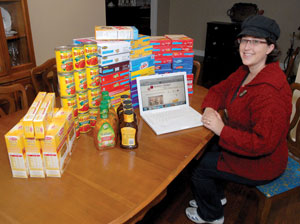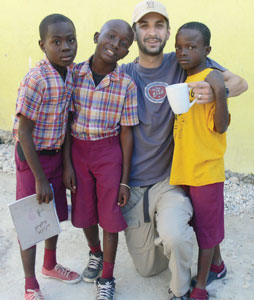Jewish Federation Next-Gen leader profile
 Neither Karen Loggia nor her husband, David Spizman, are from Kansas City. Loggia grew up in a rural suburb of Washington, D.C. Spizman is from Omaha. So it wasn’t family that enticed them to move back to this area. It was friends, schools and, perhaps more than anything, the Jewish community. But that’s getting ahead of the story.
Neither Karen Loggia nor her husband, David Spizman, are from Kansas City. Loggia grew up in a rural suburb of Washington, D.C. Spizman is from Omaha. So it wasn’t family that enticed them to move back to this area. It was friends, schools and, perhaps more than anything, the Jewish community. But that’s getting ahead of the story.
Loggia’s circuitous route to Kansas City began in Darnestown, Maryland, where she was raised Jewish with a tree at Christmas and a ham on Easter in deference to her father, who grew up Catholic. “I never questioned it till I was much older,” says Loggia, whose formal religious training ended at her Bat Mitzvah.
In high school, she belonged to a BBG youth group and attended Hillel a few times at Brown University. “But Judaism,” she says, “was not a central part of my life then.” Nor was it when she was employed in New York City as a benefits consultant in the late 1990s, nor in graduate school at Dartmouth College in New Hampshire, nor afterwards in Raleigh-Durham, where she worked in the marketing department at John Deere.
What Loggia remembers most fondly about those places is proximity to skiing and the beach. Still, despite the Midwest’s general lack of these amenities, Loggia approached her transfer to the Kansas City area in 2004 as another great adventure, and was pleasantly struck by the welcoming Jewish community she found here.
Kansas City No-Brainer
“Within days of telling people I was moving to Kansas City,” she said, “they told me about people they knew here. I reached out to them and they reached out to me.”
Loggia’s introduction to the Jewish Federation of Greater Kansas City came from friends of Ginzy Schaefer, the aunt of a graduate school friend, who suggested that Loggia participate in Women’s Division’s B’not Kehilla young leadership program. “I met a lot of fantastic women,” says Loggia, “and got to know Women’s Division Director Bev Jacobson, who asked me to help plan some programs.”
Loggia also met her future husband through those connections on a blind date in 2005. “Some friends were going to Bagels and Basketball at KU, where I met a new couple, who introduced me to David.”
The next year, Loggia found her dream job as brand manager at Whirlpool in Benton Harbor, Michigan. Spizman moved to Benton Harbor and telecommuted to Kansas City after the couple married in September 2007. “It was fun living a half mile from Lake Michigan and getting to know Chicago,” said Loggia, “but it wasn’t sustainable. We did a quick evaluation and returning to Kansas City before the birth of our child was really a no-brainer.”
Every Stage of Life
After their son, Shaefer, was born here in February 2009, Loggia reconnected with the Federation, and served that year as co-chair of the Women’s Division’s annual Note-a-Thon. This year, she joined the Federation’s Marketing Advisory Council and accepted a two-year appointment as Super Sunday co-chair. “I’m really excited to be part of Super Sunday,” she says. “It will be get-down-to-business day, making calls and sending out thank yous, but also a lot of fun.”
Federations across the country are moving to one unified logo, so Loggia and her co-chair, Steve Greenberg, orchestrated a community-wide T-shirt contest, featuring Jewish Federation’s new look. The winning design will be worn by hundreds of Super Sunday volunteers on January 30. In addition to the new T-shirt contest, they’re launching The Tzedakah Project on Super Sunday – a family-friendly scavenger hunt for 5 to 8-year olds and their families.
“What I love about the Federation,” she says, “is that while it has broad-reaching goals, whatever your stage of life you can find something it offers that resonates with your passion.”
Loggia had a major volunteer role as social media manager for the Balloon Festival, held in September for the first time in Kansas City. But staying involved in the Jewish community, for her, is a given. “Hopefully, we’ll live out our lives here,” she says. “I want to make sure my son grows up in a household rich with Jewish traditions. Volunteering in the Jewish community gives me more information and more confidence that this goal will happen.”
• Born in Washington, D.C., 1972
• Quince Orchard High School, Gaithersburg, Md.
• B.A., mathematical economics, Brown University, Providence, RI; MBA, Dartmouth College, Hanover, NH
• Lives in Leawood, Kan.
• Married to David Spizman
• Synagogue Affiliation — Congregation Beth Torah
• Now Reading “Good Night Moon,” by Clement Hurd, and “The Awakening,” by Kate Chopin
• Favorite Jewish Food — Matzo ball soup
• Trips to Israel — None
• Children — Shaefer, 2



 The board of directors of The New Reform Temple has decided not to renew Rabbi Jacques Cukierkorn’s contract, which expires at the end of May 2012.
The board of directors of The New Reform Temple has decided not to renew Rabbi Jacques Cukierkorn’s contract, which expires at the end of May 2012. Congregation Beth Torah has begun searching for a new rabbi educator. The person hired will replace Rabbi Vered Harris, the congregation’s education rabbi, when her contract expires at the end of June 2012. She informed the congregation this summer that she planned to seek a new position.
Congregation Beth Torah has begun searching for a new rabbi educator. The person hired will replace Rabbi Vered Harris, the congregation’s education rabbi, when her contract expires at the end of June 2012. She informed the congregation this summer that she planned to seek a new position. Other than the fact that Rick Recht had never been to Jewish camp, never worked with kids, and never played or written any Jewish music, he was the perfect choice to be a Jewish summer camp song leader.
Other than the fact that Rick Recht had never been to Jewish camp, never worked with kids, and never played or written any Jewish music, he was the perfect choice to be a Jewish summer camp song leader. Congregation Beth Shalom is losing both its rabbis. Senior Rabbi Robert Tobin has decided not to renew his contract. In a separate move, the Conservative congregation’s board of directors has voted to eliminate the assistant rabbi position effective July 2011. That position has been filled by Rabbi Adam Stein since the summer of 2009. The congregation was informed of these decisions in two separate e-mails sent earlier this month from Kurt Kavanaugh, D.D.S., M.S., the congregation’s president.
Congregation Beth Shalom is losing both its rabbis. Senior Rabbi Robert Tobin has decided not to renew his contract. In a separate move, the Conservative congregation’s board of directors has voted to eliminate the assistant rabbi position effective July 2011. That position has been filled by Rabbi Adam Stein since the summer of 2009. The congregation was informed of these decisions in two separate e-mails sent earlier this month from Kurt Kavanaugh, D.D.S., M.S., the congregation’s president. The decision to eliminate the associate rabbi position appears to be another step toward reducing the congregation’s deficit.
The decision to eliminate the associate rabbi position appears to be another step toward reducing the congregation’s deficit. When Mara Strom lived in Israel, she found it easy to keep kosher. Now that she’s back in Kansas City, this time with a husband and three children in tow, she’s running a kosher home — on a budget.
When Mara Strom lived in Israel, she found it easy to keep kosher. Now that she’s back in Kansas City, this time with a husband and three children in tow, she’s running a kosher home — on a budget. “I loved it! It was one of the best programs I’d ever been on,” Alfie says. “There was one bus with 40 kids. Now there are eight to nine buses.”
“I loved it! It was one of the best programs I’d ever been on,” Alfie says. “There was one bus with 40 kids. Now there are eight to nine buses.” Jack Novorr probably hadn’t heard the phrase tikkun olam or even knew what it meant when he was 5 years old. But repairing the world is exactly what he set out to do one day soon after the catastrophic Hurricane Katrina hit New Orleans in 2005, causing death, destruction and all-around chaos.
Jack Novorr probably hadn’t heard the phrase tikkun olam or even knew what it meant when he was 5 years old. But repairing the world is exactly what he set out to do one day soon after the catastrophic Hurricane Katrina hit New Orleans in 2005, causing death, destruction and all-around chaos. Scott Novorr loves children. The father of four (see related story, this page) likes nothing more than playing with his children and their friends.
Scott Novorr loves children. The father of four (see related story, this page) likes nothing more than playing with his children and their friends. The experience of purchasing a car — whether it’s new or used — is not something most people look forward to. Ron Coppaken, owner of Image Motors, characterizes it as downright painful for most people. He’s hoping to change that experience, at least for those looking for premium pre-owned vehicles, now that he’s in the business.
The experience of purchasing a car — whether it’s new or used — is not something most people look forward to. Ron Coppaken, owner of Image Motors, characterizes it as downright painful for most people. He’s hoping to change that experience, at least for those looking for premium pre-owned vehicles, now that he’s in the business.